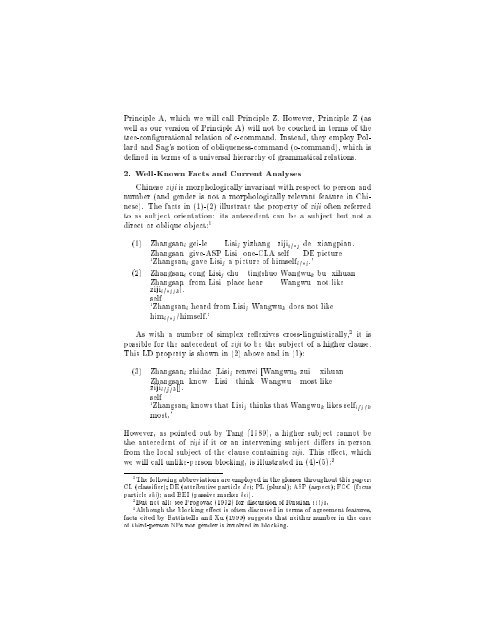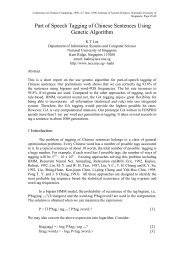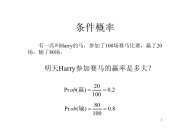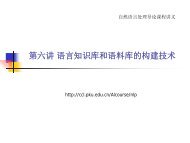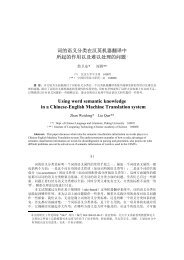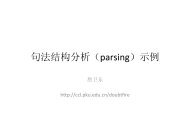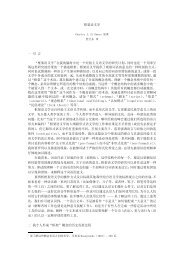A New Perspective On Chinese ZIJI
A New Perspective On Chinese ZIJI
A New Perspective On Chinese ZIJI
Create successful ePaper yourself
Turn your PDF publications into a flip-book with our unique Google optimized e-Paper software.
Principle A, which we will call Principle Z. However, Principle Z (as<br />
well as our version of Principle A) will not be couched in terms of the<br />
tree-con gurational relation of c-command. Instead, they employ Pollard<br />
and Sag's notion of obliqueness-command (o-command), which is<br />
de ned in terms of a universal hierarchy of grammatical relations.<br />
2. Well-Known Facts and Current Analyses<br />
<strong>Chinese</strong> ziji is morphologicallyinvariant with respect to person and<br />
number (and gender is not a morphologically relevant feature in <strong>Chinese</strong>).<br />
The facts in (1)-(2) illustrate the property ofziji often referred<br />
to as subject orientation: its antecedent can be a subject but not a<br />
direct or oblique object: 1<br />
(1) Zhangsani gei-le Lisij yizhang zijii= j de xiangpian.<br />
Zhangsan give-ASP Lisi one-CLA self DE picture<br />
`Zhangsani gave Lisij a picture of himselfi= j.'<br />
(2) Zhangsani cong Lisij chu tingshuo Wangwuk bu xihuan<br />
Zhangsan<br />
zijii= j=k].<br />
from Lisi place hear Wangwu not like<br />
self<br />
`Zhangsani heard from Lisij Wangwuk does not like<br />
himi= j/himself.'<br />
As with a number of simplex re exives cross-linguistically, 2 it is<br />
possible for the antecedent ofziji to be the subject of a higher clause.<br />
This LD property isshown in (2) above and in (3):<br />
(3) Zhangsani zhidao [Lisij renwei [Wangwuk zui xihuan<br />
Zhangsan know Lisi think Wangwu most like<br />
ziji i=j=k]].<br />
self<br />
`Zhangsan i knows that Lisi j thinks that Wangwu k likes self i=j=k<br />
most.'<br />
However, as pointed out by Tang (1989), a higher subject cannot be<br />
the antecedent of ziji if it or an intervening subject di ers in person<br />
from the local subject of the clause containing ziji. This e ect, which<br />
we will call unlike-person blocking, is illustrated in (4)-(5): 3<br />
1 The following abbreviations are employed in the glosses throughout this paper:<br />
CL (classi er) DE (attributive particle de) PL (plural) ASP (aspect) FOC (focus<br />
particle shi) and BEI (passive marker bei).<br />
2 But not all: see Progovac (1992) for discussion of Russian sebja.<br />
3 Although the blocking e ect is often discussed in terms of agreement features,<br />
facts cited by Battistella and Xu (1990) suggests that neither number in the case<br />
of third-person NPs nor gender is involved in blocking.


